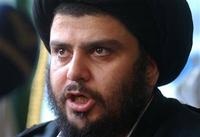Sadr militia's new muscle in south

By Jill Carroll, Correspondent of The Christian Science Monitor
Wed Sep 21, 4:00 AM ET
Moqtada al-Sadr, the young Shiite cleric who promised to disband his militia after clashing with US forces last April, proved this week that he remains a potent threat to both coalition troops and Iraq's fledgling government.
In a dramatic battle against British forces in Basra, Mr. Sadr quickly mobilized scores of supporters to descend on tanks, setting at least one alight and injuring three British soldiers on Monday.
While the British Army's strategy of appeasement has brought quiet to the Shiite-dominated south for some time, it has allowed militias such as Sadr's Mahdi Army to quietly regroup and flourish. Consequently, Sadr's followers - who have close ties to the city police - have more control of Basra's streets than British troops.
This control has also created a climate of fear among many residents not unlike that under Saddam Hussein. There are whispers that Sadr has established his own sharia courts, which issue rulings based on Islamic law. The Mahdi Army enforces its decisions, Basra residents say.
To build his network of loyal followers, Sadr offers payments to the families of his militia members who died in the fighting in August. Some 3,000 families are dependent on money or other help from the Sadr movement.
When an Iraqi is in poor health in Baghdad, more often than not it's a Sadr movement member who provides aid. Sadr movement officials run the Health Ministry, extending influence from the hospitals to the ambulance service. Posters, stickers, and other memorabilia of Sadr are plastered on Ministry of Health checkpoints, hospitals, and the walls of Baghdad's main ambulance center.
Despite years of community outreach, British forces had no better recourse Monday to free two soldiers arrested by police loyal to Sadr than to ram the jail where they were initially held with tanks. When the British discovered the soldiers were not there, they raided a nearby house where the two were being kept by militia members, according to the British.
"I have no doubt that there was an institutional desire on the part of the British military to have good relations with as many Iraqis as possible," says Robert Springborg, director of the London Middle East Institute that gave Iraq-bound British solders cultural sensitivity training. "It's much less a military problem than a political problem. [But] the resolution of the problems is beyond the control of the British government ... no one really is in control of this [political] process now and that's worrying."
The spark that caused the violence in Basra was the arrest Sunday of leading Sadr cleric Ahmed al-Fertusi and his assistant by British troops. The British claimed they were responsible for planning attacks on their forces. With tension already high between Sadr followers and British troops, Sadr demonstrators poured into the streets to demand Mr. Fertusi's release.
The next day, two British military personnel disguised as Iraqis engaged in a gun battle with Iraqi police, killing one police officer, according to varying accounts. The police eventually captured the two men. When British tanks arrived to free the detainees, crowds attacked them.
Top Sadr official Abbas Rubaie has charged the two undercover British officers with planting roadside bombs in order to justify a longer military presence in the country.
"What the British are doing in Basra is terrorism. They are attacking [British] troops so they can say 'someone attacked us and we need to stay as long as possible,' " Rubaie said.
A statement from the Sadr movement claimed that the two British undercover officers had also been firing into a crowd of pilgrims Monday going to a local shrine to mark the birth of the Imam Mehdi, the 12th and last Imam, or Shiite saint.
They also charged that when "the people of Basra demonstrated" to stop British tanks from freeing the two officers from jail, the troops fired on the crowd "killing and wounding many of them." They said the British tanks crashed into the jail allowing "150 terrorists" to escape.
Iraqi officials Tuesday condemned the British operation. "It is a very unfortunate development that the British forces should try to release their forces the way it happened," Haider al-Ebadi, an adviser to Prime Minister Ibrahim Jaafari, said at a news conference in Baghdad.
While one of Iraq's major cities, Basra is more like a small town, residents say, where everyone knows everyone. People could once play music outside, unmarried couples could once walk together. But as several Shiite groups vie for power, many worry the militias, particularly Sadr's, have forever changed the mood of their city.
These days saying anything against the Mahdi Army or its rival, the Badr Organization backed by ruling Shiite Islamist party Supreme Council of the Islamic Revolution in Iraq (SCIRI), can be deadly.
"No one trusts anyone," says Ali Abdel Zahara one of few Basra residents willing to discuss the situation and who gave a false name for fear of retribution from the militias. "You can't talk about this, even at home."
He says Sadr has emerged as the most powerful force among the many groups that are controlling different sections of the town and police. "The ones that are in control are the tribes and the parties. Each one in the police is a representative of his party or his tribe," says Zahara. "Sadr is the biggest because they always solve the problems they face with violence."
In further evidence of the violence that has gripped Basra, Fakher Haider, an Iraqi journalist working with The New York Times was killed Sunday after being abducted by men who witnesses said claimed to be police officers. He was found dead outside the city early Monday. Early last month, Monitor contributor Steven Vincent was abducted by men who, according to witnesses, drove police vehicles. Like Mr. Haider, he was discovered dead not long after being abducted.
Link Here




0 Comments:
Post a Comment
<< Home